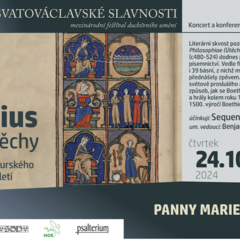In October 2024, Sam Barrett and Sequentia will participate in 'Boethius 524-2024', an interdisciplinary conference organised by the Association for Central European Cultural Studies in collaboration with the Faculty of Arts at Charles University in Prague, to commemorate the 1500th anniversary of the death of Ancius Manlius Severinus Boëthius (d. 25 October 524 in Pavia, Italy).
On the evening of Thursday 24 October, Sequentia will perform Boethius's Songs of Consolation, at the Kostel Penny Marie Pod Retézem (The Church of our Lady Beneath the Bain).
Then on Friday 25 October, Prof Barrett will give a lecture-recital alongside Sequentia, on 'Singing and Listening to the De consolatione philosophiae in the Early Middle Ages'.
This lecture-recital explores different ways into the question of how the poetic portions of the De consolatione philosophiae were sung and heard in the Early Middle Ages. We begin with an account of the emotions stirred by listening to this text recorded by Æthelweard (d. c. 998), historian and author of a Latin version of the Anglo-Saxon Chronicle. Questions raised by his account lead into a presentation in three parts. First, we consider descriptions of singing and listening given in the De consolatione philosophiae, proposing that both were essential in drawing the prisoner into a close relationship with Philosophia that proved vital to his restoration. Secondly, we examine evidence for the singing of the De consolatione philosophiae in the ninth to twelfth centuries, contemplating details in the recovered leaf of the Cambridge Songs manuscript that suggest that styles of singing were chosen in response to specific modes of vocal delivery implied in the narrative. Finally, we listen to and explore the significance of recently discovered polyphonic settings of four poems recorded ca. 1100 in Aquitaine, placing these song styles within a specific cultural milieu and arguing that their ‘twofold song’ provided new ways of figuring the dialogue that lies at the heart of Boethius’ final work.
The full programme for the conference can be found here.

